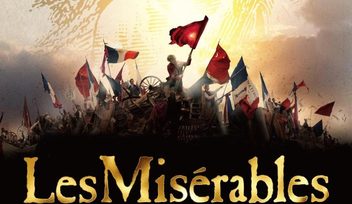
The story of Les Misérables can be divided in three interrelated stories—almost in a Russian doll style (a story within a story). The first one is about convict Jean Valjean (Hugh Jackman, X-Men)—or prisoner 24601—who spent the last nineteen years of his life being a member of a chain-gang in Toulon, as part of his sentence for stealing a loaf of bread and trying to escape several times. He is given a yellow ticket of leave by the unwavering, law-abiding officer Javert (Russell Crowe, Gladiator), which means he will be on parole forever because he has been deemed a dangerous man. When he arrives to Digne and meets the town’s bishop, he has to decide what he’s going to do with his life. His choices set off a chase of cat and mouse between Javert and himself.
The second story is set eight years later, and it starts off with one of Monsieur Madeleine’s factory workers, Fantine (Anne Hathaway, The Devil Wears Prada), being fired and thrown to the streets, having to fend for herself, because she has an illegitimate child and she's paying a pair of innkeepers (Sacha Baron Cohen, The Dictator, and Helena Bonham Carter, The King’s Speech), to take care of her.
The third story starts in 1832 in Paris with a group of students and activists in favor of the Republic, known as Les Amis de l’ABC, who are planning a revolution against the government. Their leader is Enjolras (Aaron Tveit), with Combeferre (Killian Donnelly) and Courfeyrac (Fra Fee) as second and third in command; or the trio better known in the book as the chief, the guide and the center. Marius (Eddie Redmayne, My Week with Marilyn), one of the members of Les Amis, finds himself—unknowingly—in between a love triangle, when both Cosette (Amanda Seyfried, Letters to Juliet) and Éponine (Samantha Barks) have feelings for him.
This is a movie about choices—between law and morality—about love and, ultimately, about forgiveness. Among its themes, we can find the protagonists' relationship with God, the character's personal struggles to do what is right (whatever they think that is), and how far people will go for the ones they love. Les Misérables is a complex movie, full of nuances that take time to uncover, and it can easily be dismissed as nothing more than a movie that can tug the heart’s strings.
Avid fans will be likely to point out that the movie has some "plot holes," however the film is already two hours and a half long, and it's an adaptation. During the transfer from one medium to another, it's going to lose some details, but that's nothing new. The book is 1,400+ pages long, if they decided to put everything in, how long would that movie be? Ten hours, at least? Instead they should focus on the many good qualities it has like the historical accuracy in the costumes, the breathtaking CGI (Computer-generated imagery) crane shots, the music, or the new song composed by the original team that created the musical--just to name a few.
Although some critics and fans alike have some problems with the casting, I’m pleased with it, and it's one of my favorite qualities of the film. I like that there’s a mixture of A-list actors, West End actors and one Broadway actor. What most people don’t know is that all of them have ties to either musical theater or the musical Les Misérables itself. For example, all the West End actors (Donnelly, Fee and Barks) have played characters in the stage-version, with Donnelly and Barks playing Courfeyrac and Éponine, respectively, in the 25th Anniversary concert. Each of the actors brought out something special out of their characters, and I, sincerely, believe that the movie wouldn't be what it is without this specific cast.
The live-singing while filming, although it was a feat for the actors, paid off in the end. It gave the actors more liberty in terms of range of emotion, instead of having to stick to the emotion the playback was giving. This added pungency to the film and added a layer of realism to the characters.
As a last note, if you don't like musicals, or if you get the feeling you'll ram your head into a wall when you listen to people singing for long periods of time, then this is not the movie for you; you can probably count with your hands the times something is actually spoken. If you don't care about that, then I invite you to watch this story about love, hope and forgiveness. It's a movie that deserved all it got and probably more. It also opened up the possibility for other musicals to be adapted into movies, after what this movie pioneered to do.
Hugh Jackman - Suddenly
Cast - One Day More (Oscars Version)


 RSS Feed
RSS Feed